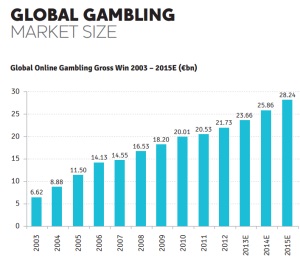It’s always interesting to see what the crystal ball gazers and soothsayers have to say about the online gambling market. We all know its getting more popular, thanks to the rise of smartphones and tablets, and faster connections, but it’s good to see the numbers.

The Only Way is Up, Baby. From H2GC
And that’s where the Mystic Megs of the Online Gambling world come in: H2 Gambling Capital have a new report out called, creatively, the H2 Interactive Gambling Report (which was sponsored by html5 Propeller Heads Odobo who are busy making the best of the best mobile casino games. They’re not flash).
Real-money gambling continues to surge and games developers like Odobo are piling in to the action. This area is potentially the most lucrative sector in games.
Regulated real-money online gambling (not including lottery and skill-based games), already pulls in around $30bn in gross win globally, with the UK and Europe making up over half the market. But the elephant in the room is the United States: recent legislation passed in several US states sets up the scene for legal online gambling and could mean that by 2017 the US may make up to 30% of the global online gaming market and pull in gross win just over $7.4bn: This will continue to grow year on year.
The other sleeping giant is social casino gambling (all those Facebook slots)- if this crosses over to real-money gambling H2GC reckon that’s worth another $30bn in 2012 and could head up to over $40bn by 2015.
Odobo is launching a website for players called Odobo Play where they will showcase all of their games and point people to casinos that run them. Looks like they are hedging their bets on a consumer facing brand then? I wonder how that will go down with the casinos.
The new revenue opportunity in online real-money gambling is too big for companies in the games business to overlook. The H2 Gambling Capital report is free. You can download it here from Odobo. There’s a big section on affiliates, which is quite interesting. Odobo have their eyes on the money that is earned by affiliates sending players to casinos. They want a piece of the action, and they want to share the proceeds with their developers, so in effect they want to create “developer affiliates” or “affiliate developers”. They are hoping that this is facilitated by social media etc.
I suppose the six million dollar question here is can they find people who are good at developing games and marketing? This may suit some of the bigger affiliates and bigger developers who can pull in the resources. In any case, it’s an interesting development.
Key Points From the Report